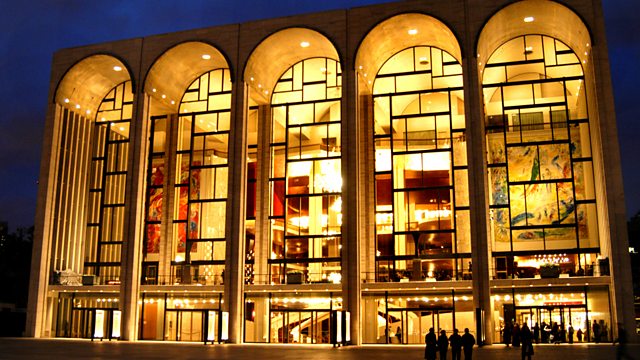
Wagner's Tannhauser
James Levine conducts Wagner's early masterpiece Tannhauser at the Metropolitan Opera, New York. With Johan Botha, Eva-Maria Westbroek, Peter Mattei and Michelle DeYoung.
James Levine conducts Tannhäuser, Wagner's early masterpiece, in its first return to the Metropolitan Opera in more than a decade. One of today's leading Wagnerian tenors, Johan Botha, takes on the title role of the young troubadour knight who is torn between spiritual love and carnal desire. Wagner's opulent score melds together the worlds of the sacred and profane.
Tannhauser, having been charmed by love goddess, Venus, comes to his senses and returns to his mortal love, the chaste heroine Elisabeth. However he sings of passionate rather than courtly love, which shocks her and her community. He promises to seek atonement and redemption, but the illicit attraction of Venus continues to beckon.
Presented live from the Metropolitan Opera, New York by Mary-Jo Heath with commentary by Ira Siff.
Wagner: Tannhäuser
Elisabeth..... Eva-Maria Westbroek (soprano)
Tannhäuser..... Johan Botha (tenor)
Venus..... Michelle DeYoung (mezzo-soprano)
A young shepherd..... Ying Fang (soprano)
Hermann, Landgraf of Thuringia..... Günther Groissböck (bass)
Walther von der Vogelweide..... Noah Baetge (tenor)
Biterolf..... Ryan McKinny (bass-baritone)
Wolfram von Eschenbach..... Peter Mattei (baritone)
Heinrich der Schreiber..... Adam Klein (tenor)
Reinmar von Zweter..... Ricardo Lugo (bass)
Page..... Daniel Katzman (treble)
Page..... Connor Tsui (treble)
Page..... Michael Graham (treble)
Page..... Thomas White (treble)
Page..... Ruby Gilmore (soprano)
Page..... Emma Kramer (soprano)
Page..... Andre Gulick (treble)
Page..... Brandon Harnett (treble)
Three Graces..... Mary Beth Hansohn, Maria Luiza Luisi, Sarah Weber-Gallo
Orchestra and Chorus of the Metropolitan Opera, New York
James Levine (conductor).
Last on
More episodes
Music Played
-
![]()
Richard Wagner
Tannhauser - Act I
Singer: Johan Botha. Singer: Eva-Maria Westbroek. Singer: Gunther Groissbock. Singer: Michelle DeYoung. Singer: Ying Fan. Singer: Peter Mattei. Singer: Noah Baetge. Singer: Ryan McKinny. Singer: Adam Klein. Singer: Ricardo Lugo. Choir: Metropolitan Opera Chorus. Orchestra: Metropolitan Opera Orchestra. Conductor: James Levine. -
![]()
Richard Wagner
Tannhauser - Act II
Singer: Johan Botha. Singer: Eva-Maria Westbroek. Singer: Gunther Groissbock. Singer: Michelle DeYoung. Singer: Ying Fan. Singer: Peter Mattei. Singer: Noah Baetge. Singer: Ryan McKinny. Singer: Adam Klein. Singer: Ricardo Lugo. Choir: Metropolitan Opera Chorus. Orchestra: Metropolitan Opera Orchestra. Conductor: James Levine. -
![]()
Richard Wagner
Tannhauser - Act III
Singer: Johan Botha. Singer: Eva-Maria Westbroek. Singer: Gunther Groissbock. Singer: Michelle DeYoung. Singer: Ying Fan. Singer: Peter Mattei. Singer: Noah Baetge. Singer: Ryan McKinny. Singer: Adam Klein. Singer: Ricardo Lugo. Choir: Metropolitan Opera Chorus. Orchestra: Metropolitan Opera Orchestra. Conductor: James Levine. -
![]()
Darius Milhaud
Scaramouche - no.3; Brazileira [Mouvement de Samba]
Performer: Michael Collins. Performer: Piers Lane.- The Virtuoso Clarinet, Vol. 1.
- Chandos.
Synopsis
ACT I
Wartburg castle and environs, medieval Germany. The minnesinger Tannhäuser, having spent a year in the magical underground realm of Venus, the goddess of love, longs to return to the human world. He pays tribute to Venus in a song but ends by asking her to let him go. Surprised, Venus promises him even greater pleasures, but when he insists and repeats his pleas, she furiously dismisses him and curses his desire for salvation. Tannhäuser cries out that his hope rests with the Virgin Mary—and suddenly finds himself transported to a valley near the castle of the Wartburg.
A procession of pilgrims passes on the way to Rome. Tannhäuser is deeply moved and praises the wonders of God, as horns announce the arrival of a hunting party. It is Landgrave Hermann with his knights. Recognizing Tannhäuser as their long-lost friend, they beg him to return to the castle with them, but Tannhäuser is reluctant. Wolfram, one of the knights, reminds him that his singing once won him the love of Elisabeth, the Landgrave’s niece. On hearing her name, Tannhäuser understands what he must do and joins his companions.
Ìý
ACT II
Elisabeth joyfully greets the Wartburg’s Hall of Song, which she hasn’t set foot in since Tannhäuser left. He is now led in by Wolfram. Elisabeth, at first shy and confused, tells Tannhäuser how she has suffered in his absence, but then joins him in praise of love. Observing their emotional reunion, Wolfram realizes that his own affection for Elisabeth is hopeless.
Landgrave Hermann is delighted to find his niece in the Hall of Song, and together they welcome their guests who have come for a song contest. The Landgrave declares love the subject of the competition and promises the victor to receive whatever he asks from the hand of Elisabeth. Wolfram opens the contest with a heartfelt tribute to idealized love. Tannhäuser, his thoughts still on Venus, replies with a hymn to worldly pleasures. Other singers counter his increasingly passionate declarations until Tannhäuser breaks out into his prize song to Venus, to the horror of the guests. As the men draw their swords, Elisabeth throws herself between the parties to protect Tannhäuser and begs the knights for mercy. The Landgrave pronounces his judgment: Tannhäuser will be forgiven if he joins the pilgrims on their way to Rome to do penance. Tannhäuser falls at Elisabeth’s feet and rushes from the hall.
Ìý
ACT III
Several months later, Wolfram comes across Elisabeth praying at a shrine in the valley. A band of pilgrims, back from Rome, passes by, but Tannhäuser is not among them. Broken with grief, Elisabeth prays to the Virgin Mary to receive her soul into heaven. Wolfram gazes after her and asks the evening star to guide her way. Night falls, and a solitary pilgrim approaches. It is Tannhäuser, ragged and weary. He tells Wolfram of his devout penitence on the way to Rome—of his joy at seeing so many others pardoned, and of his despair when the Pope proclaimed that he could no more be forgiven for his sins than the papal staff bear green leaves again. Left without hope, all he wants now is to return to Venus. He summons her and she appears, just as Wolfram once again brings Tannhäuser to his senses by invoking Elisabeth’s name. At this moment, Elisabeth’s funeral procession comes winding down the valley. With a cry, Venus disappears. Tannhäuser implores Elisabeth to pray for him in heaven and collapses dead. As dawn breaks, another group of pilgrims arrives, telling of a miracle: the Pope’s staff, which they bear with them, has blossomed.
- With thanks to the Metropolitan Opera, New York
Broadcast
- Sat 23 Jan 2016 18:00Â鶹ԼÅÄ Radio 3


